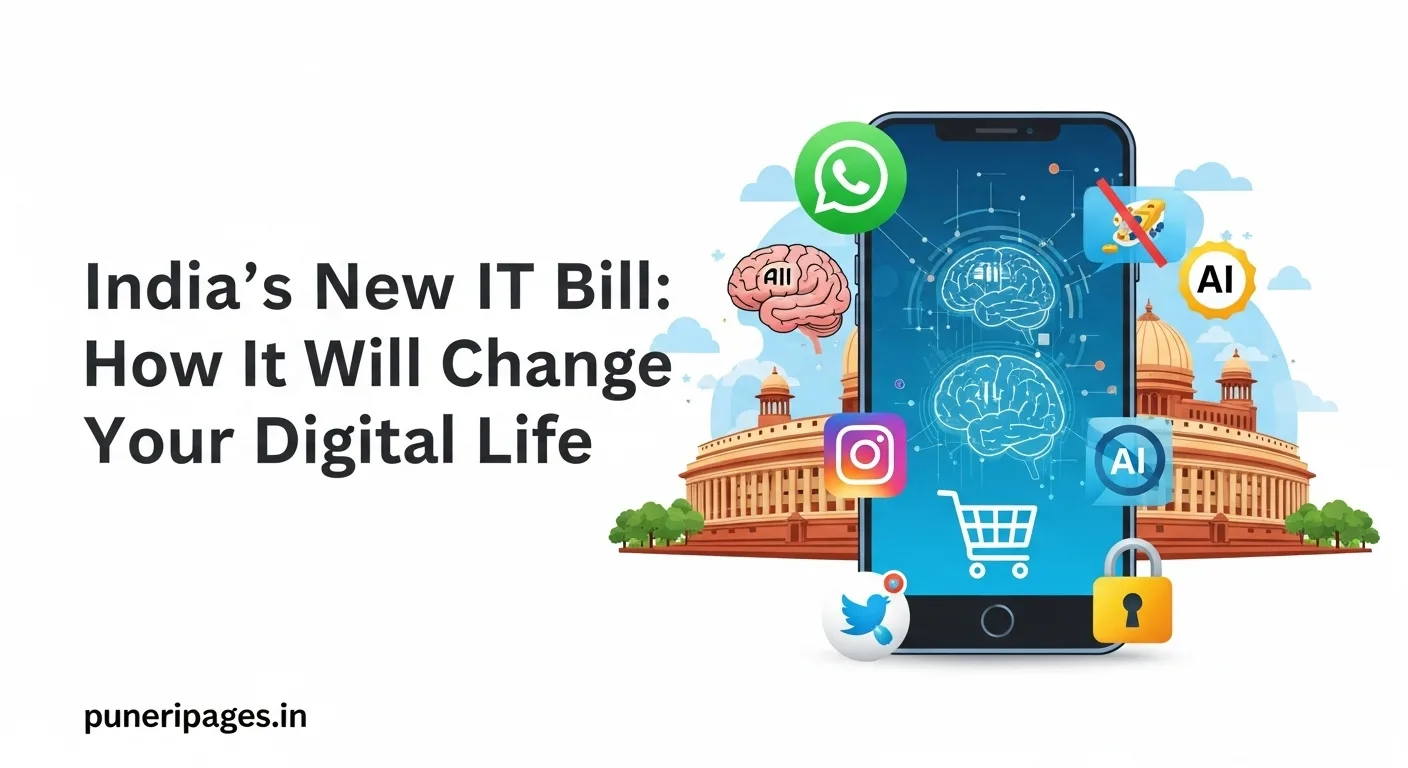
India's New IT Bill is set to rewrite the rules of your online world — from privacy to AI. Here's what you need to know. | puneripages.in
By Prashant for PuneriPages.in
Think about it: the way you scroll through Instagram, message friends on WhatsApp, shop on Amazon, or even protect yourself from online scams — all of that could change in the coming months. The Indian government is about to introduce a brand-new Information Technology (IT) Bill in Parliament, replacing a law that’s older than Facebook, YouTube, and the iPhone combined. This isn’t just some political formality; it’s a blueprint for how we’ll live and work online in the years ahead.
Table of Contents
Why Now?
The IT Act of 2000 was born in a time when cybercafes were the “modern” way to get online, and mobile phones were just… phones. Fast forward to today: India has over 800 million internet users, an economy increasingly powered by digital trade, and a whole new set of online challenges — from viral fake news to AI-generated deepfakes. The old law simply doesn’t cut it anymore, and the government says it’s time for a digital rulebook that matches the realities of 2025.
Key Areas the New Bill Will Cover
1. Your Data & Privacy
Imagine being able to tell a company to delete every trace of your personal info from its servers. The bill might finally make that possible with the “right to be forgotten.” It’s expected to introduce tougher rules on how businesses collect, store, and use your data.
2. Social Media Regulation
Your feed might start looking a little different. Platforms like Facebook, Instagram, and X could be made more accountable for tackling harmful content — think fake news, hate speech, and online harassment.
3. Big Tech Accountability
From how search results appear to ensuring fair competition, the bill could force big tech companies to operate more transparently and responsibly in India.
4. Cybercrime & Online Safety
Online scams, phishing links, identity theft — the bill aims to tighten the net on these crimes so your digital life feels safer.
5. Rules for AI and Emerging Tech
Deepfakes and rogue AI chatbots are no longer science fiction. This could be India’s first step towards setting boundaries for artificial intelligence and other cutting-edge tech.
The Three Perspectives
Government: Wants to create a “safe, trusted, and accountable” internet that shields citizens from harm while fuelling digital growth.
Tech Industry: Concerned that heavy-handed rules might slow down innovation, drive up costs, and make moderating content a nightmare.
Civil Society & Privacy Advocates: Wary that the bill could open the door to government overreach, weaken privacy, and limit free expression.
How a Bill Becomes Law in India – The Journey of the IT Bill
- Tabling: The bill is introduced in Parliament (that’s happening right now).
- Debate & Discussion: MPs argue over what stays, goes, or changes.
- Standing Committee Review: A closer inspection by experts and MPs.
- Voting: Both Lok Sabha and Rajya Sabha must give the green light.
- Presidential Assent: The President signs it, and it becomes law.
Why It Matters to You
This isn’t just a story about tech giants or legal jargon — it’s about your everyday life. The New IT Bill will decide how safe you feel online, what you can or can’t post, and how much control you have over your own data.
The coming debates in Parliament will shape India’s digital destiny. And while you might not get to vote on the bill directly, understanding what’s at stake is your first step to making sure your voice — and your rights — are part of the future.